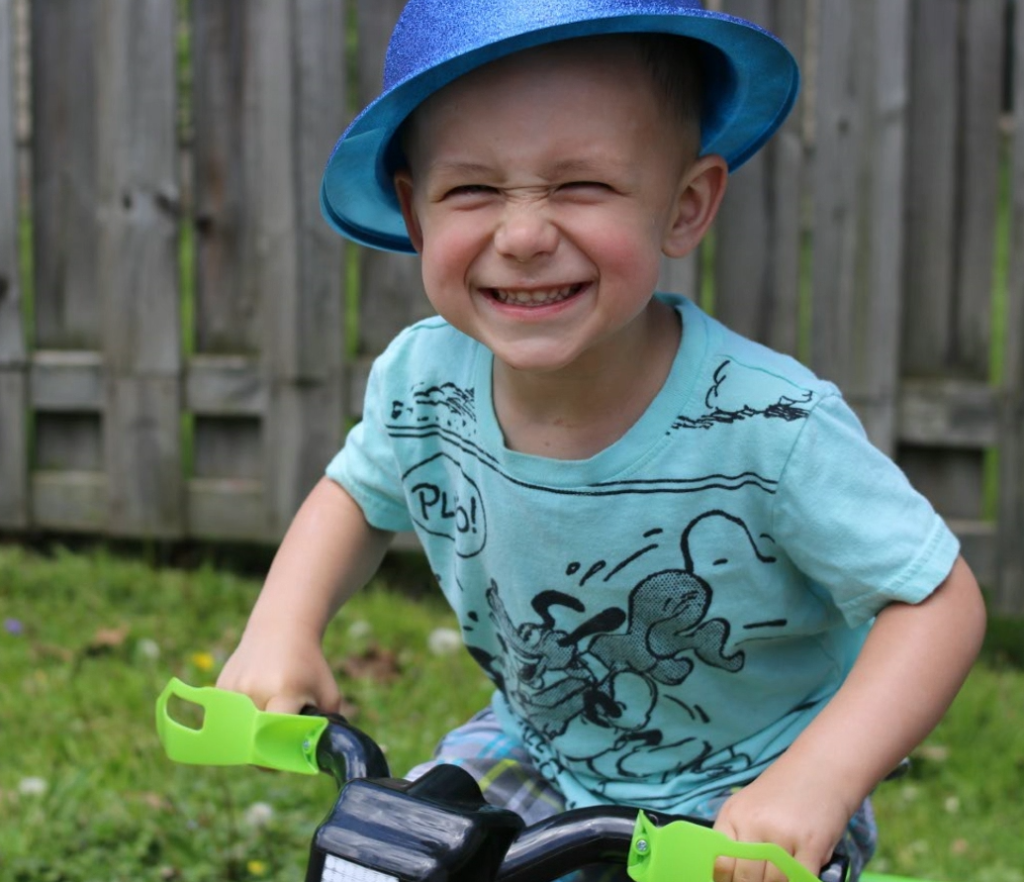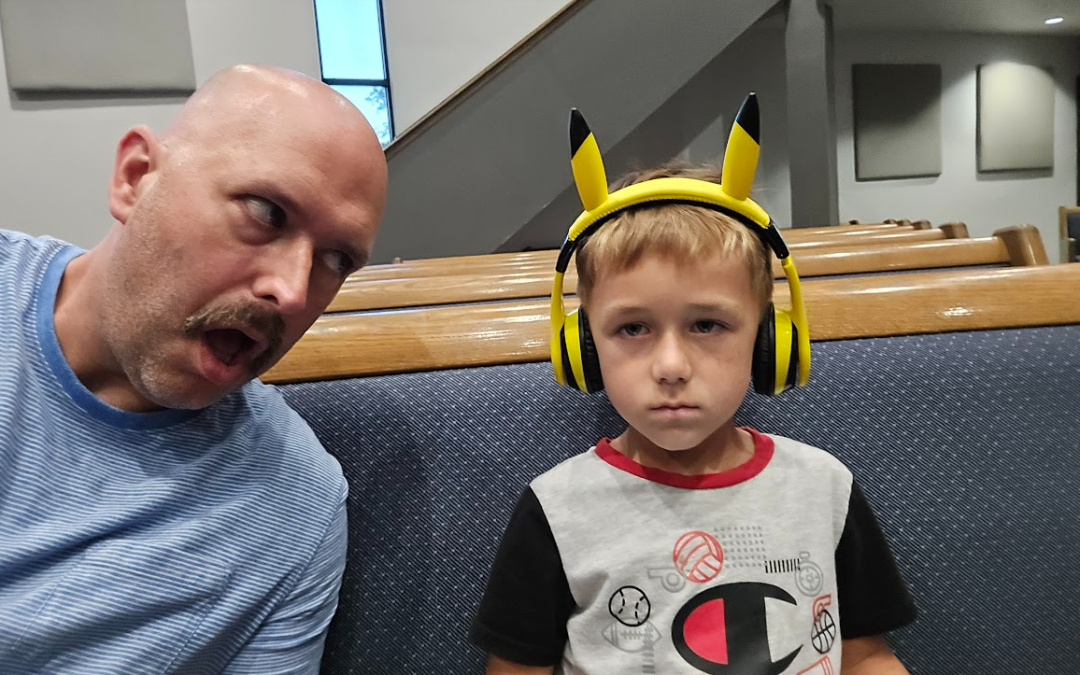At the start of my journey as a single dad, my mindset was in a pretty dark place. The days felt heavy, and I often found myself just staring at the walls, feeling like time had come to a standstill.
The hardest part wasn’t just staying strong for myself; it was the weight of knowing I had to be present and whole for my son, Tanner, even when I felt broken inside.
But even in those low moments, I knew I had to keep going. There wasn’t a big, sudden realization that I needed to stay positive—it was something I knew all along. The real challenge was building up the strength to manage it. The habits and systems I had built over the years became my lifeline, the quiet anchors that kept me grounded when everything else felt like it was slipping away.
In the beginning, I put a lot of pressure on myself to be the “perfect” dad—to get everything right, to handle everything perfectly.
But over time, I realized that striving for perfection was only making things harder. Trying to be perfect wasn’t helping me or Tanner—it was draining me. And now, perfection isn’t even the goal anymore.
What I’ve learned instead is that it’s not about being flawless; it’s about resilience. It’s about having the resolve to keep pushing forward, even when things feel impossible. Tanner has always been my biggest motivation to stay strong, but the real change happened when I let go of the need to be perfect and instead embraced the power that comes from simply moving forward—imperfectly, but with resolve.
The Biggest Challenges to My Positivity
On the weeks that I don’t have Tanner, everything feels a little heavier. While I can use that extra time to dive deeper into work or spend time with friends, there’s always that void—knowing I can’t see my son every day because of decisions outside my control.
Those weeks are tougher emotionally. I don’t feel as motivated, and often, once the workday is done, I find myself crashing on the couch for hours, trying to fill the hours with anything that might distract from the emptiness. It’s hard to navigate the silence that comes with missing my son.
I used to let those feelings consume me, melting into that lack of motivation. But now, I’ve realized that just because I feel down doesn’t mean I have to give in to those emotions.
It’s okay to feel sad, but it’s important to keep pushing forward, even in a limited capacity.

I’ve learned that if I let myself wallow and don’t get anything done, I end up paying the price later when I come out of it and face a pile of neglected tasks. Allowing myself to feel those emotions, but also staying on track with small, manageable tasks, keeps me from falling into a deeper slump.
That’s where structure comes in. I rely on my to-do list to keep me focused during these tougher weeks. It’s not about packing the day full of tasks—it’s about doing what I can. Even the smallest action helps prevent things from piling up later.
Strategies I Use to Stay Positive
Staying positive isn’t something that just happens. It’s the result of intentional habits I’ve built over time.
And while every day isn’t perfect, having these routines in place makes it a little easier to navigate the tougher days. The biggest game changer for me has been my spiritual practices—prayer, meditation, and reading the Bible. These habits keep me grounded and aligned with God’s plan, even when everything else feels chaotic. In the midst of the noise, prayer and meditation help me find clarity, quiet the doubts, and reconnect with something bigger than myself.
Along with my spiritual practices, I rely on my daily log. Each morning, I write down three things I’m grateful for, as well as three things that will make the day great. Taking time to think about what could improve my mood—sometimes it’s the thought of a bike ride with Tanner, a soak in the hot tub, or a quiet church service that gives me something to look forward to. Pairing this with three key tasks for the day keeps me grounded and focused, even when motivation is low.
Physical activity also plays a huge role in keeping my mindset in check. Whether it’s going for a walk, hitting the gym, or just being outside, getting my body moving each day helps my mind stay sharp. Exercise has always been a natural mood booster for me, so I make it a priority, no matter how small the effort.
On the weeks without Tanner, the challenge intensifies. But I’ve learned that filling those moments intentionally is key. Whether it’s going for a solo bike ride, grabbing dinner by myself, or diving into an audiobook or podcast, I try not to let that time slip away in self-pity. Staying active—both physically and mentally—makes all the difference.
The Role of Faith and Mindfulness
At the core of my ability to stay positive, especially when life feels impossible, is my faith. If I’m being completely honest, God saved my life. When this divorce hit me out of nowhere, and I suddenly lost access to my child, I was on the verge of ending it all. I had spent years committed to self-development, diving into personal growth classics like Think and Grow Rich by Napoleon Hill and Rich Dad Poor Dad by Robert Kiyosaki. They had shaped me in many ways but when I faced my darkest moment, I realized something was still missing.
That missing piece was God.
In that moment of complete despair, I did the only thing I knew to do—I cried out to Him. I questioned everything—why this was happening, what I had done to deserve it—and for a while, I was consumed by my pain. But through His love, mercy, and grace, God helped me realize that it wasn’t just about me—it was about something bigger. And through that, I began to understand that I couldn’t do life successfully without Him.
That moment became a turning point for me. Right away, I made prayer, meditation, and reading the Bible part of my daily routine. At first, I approached these practices with urgency and discipline, doing them every day without fail. But as things began to improve, I found myself slipping, and I had to learn the importance of discipline. Now, I recognize that human nature doesn’t always want to do these things, but that’s exactly why it’s so important to keep them as non-negotiable parts of my life.
Prayer allows me to realign with God’s plan when everything else feels chaotic. It’s a space where I can talk through my struggles and listen for guidance. Meditation helps me stay present,grounding me in the moment when my thoughts want to race ahead or dwell on the past. When I meditate, I focus on the sensations in my body and the thoughts that come up, but without judgment. Over time, this practice has helped me interrupt automatic reactions and stay more aware of the choices I’m making. It becomes easier to notice when I’ve drifted and gently pull myself back to awareness.
Reading the Bible reminds me of the bigger picture—that there’s a purpose and a plan beyond my current struggles. Together, these practices keep me grounded and give me the strength to keep moving forward, even when life feels overwhelming.
How Tanner Keeps Me Going
While my faith keeps me grounded, Tanner is the force that keeps me moving forward.

There’s an undeniable purpose that comes with being a father, especially on the hard days. Tanner may only be five years old, but every moment with him reminds me of why I push through the challenges. His presence fills the space with light, and in that light, I find strength.
One of the greatest joys of being a dad is watching Tanner figure things out. Even though he’s still young, I can see the gears turning in his mind when we’re talking or when he’s trying to solve something on his own.
It’s in those moments, whether we’re sitting on the couch or laying in bed, that I get to see him truly growing and learning. My role isn’t to give him all the answers but to guide him, to be there as he learns to find his own way. And as I do, it reminds me how important it is to be here for him, to help shape the person he’s becoming.
When Tanner is with me, I notice how much more positive and relaxed I feel. I let go of the rigid expectations I often impose on myself and instead embrace the joy of spontaneity—whether that’s playing video games together or simply hanging out. Of course, there are times when my patience is tested—especially as he’s growing and pushing boundaries—but the positives always outweigh those moments.
The small “dad tasks” are some of my favorites. Every night, we read books together before bed, and I love putting on all the voices and emotions, making the stories come alive for him. Preparing his lunch for school, laying out his clothes—these little routines bring me joy. They aren’t just chores; they remind me of the importance of being present, of showing up for him in every way I can.
But Tanner doesn’t just bring me joy—he also motivates me to be better. Going through this divorce has been tough, and part of what drives me to constantly improve is the fear of losing him. The court system isn’t always kind to fathers, and the false claims I faced early on nearly took him from me. That fear became fuel. It pushed me to double down on my self-improvement, to ensure that I would never give the system a reason to take him away. In that process, I’ve become more mindful of my words, my actions, and the way I show up as a father.
Tanner is my constant reminder of what’s important. Every day, he gives me a reason to keep going, to keep growing, and to strive to be the best father I can be.
Personal Growth in Positivity
Becoming a single dad has pushed me to grow in ways I never expected. While I’ve always been committed to self-development, the experiences I’ve faced over the last few years—especially the divorce and the struggles with the court system—have made personal growth not just a goal, but a necessity.
One of the biggest areas where I’ve grown is in my discipline. I’ve learned how to set up systems and processes that allow me to get the important things done, whether it’s work, spending time with Tanner, or taking time for myself. Having discipline doesn’t just mean being productive; it actually creates more space for flexibility and fun, because I know the important things are handled. It’s a balance that has allowed me to experience more of life while still staying focused.
I’ve also grown in my understanding of emotions. I used to let emotions control me, but now I’ve learned how to feel them without letting them take over. Having Tanner has been one of the greatest tests of patience—and, unexpectedly, one of the greatest teachers. I’ve never been known for being a patient person, but becoming a father has changed that. People in my life have noticed, and I’ve noticed too—it’s a constant reminder that growth happens, even when you’re not always looking for it.
The challenges I’ve faced—particularly the divorce—have played a big role in this growth. I’ve learned to take responsibility where I can, even when something wasn’t my fault. There’s a power in realizing that while you can’t control everything, you can control how you respond and what you take away from it. That mindset shift has been crucial for me. Instead of seeing myself as a victim of circumstance, I’ve embraced the idea that my challenges have given me strength and the ability to grow. I used to hate the traumas I’d gone through, but now I see them as the source of my “superpowers.”
One of the most important lessons I’ve learned is that all I really need is myself and God. That doesn’t mean I don’t value relationships or other people, but I’ve stopped relying on others for validation or approval. At the end of the day, I need to be at peace with myself and in alignment with God’s plan for me. Everything else is secondary.
Balancing personal growth for myself and being a better father for Tanner is something I’m constantly working on. Part of my growth is motivated by my desire to be the best dad I can be, but there’s also a personal drive to become the best version of myself for me. It’s a balance between taking care of myself—so I have the energy and capacity to be there for others—and growing for the people I love. There’s nothing wrong with being a little selfish at times, as long as it allows me to be a better father, friend, and person overall. I’ve learned that it’s not about perfection, but about doing the best I can with what I have.
When Staying Positive Feels Impossible
Even with all the personal growth I’ve experienced, there are still days when staying positive feels like a losing battle. No matter how much I’ve worked on myself, bad days still happen, and I’ve learned to accept that. The key for me isn’t about trying to stop those days from happening—it’s about how I handle them when they do.
On the days when staying positive feels impossible, I’ve learned to just take those moments for myself. If I need to take a mental health day, I take it. It’s about leaning into the day as it is, instead of fighting it or being too hard on myself.
I’ve also learned that persistence is key. For me, persistence doesn’t mean pushing through with sheer willpower—it’s about sticking to the routines and habits I’ve built. My daily routine and activities are there for a reason, and even on days when positivity feels out of reach, those systems help me stay grounded. It’s about showing up for the routine, even when I don’t feel like it, because I know that those habits are what keep me moving forward.
Growing up, I didn’t always give myself grace. I was raised with a strong work ethic, but it often came with a sense of disappointment if I wasn’t meeting impossibly high standards. For a long time, I carried that mindset into adulthood, constantly feeling like I wasn’t doing enough. But through time, counseling, and personal growth, I’ve learned to be kinder to myself. I’ve learned that it’s okay to take a step back, recharge, and not have everything figured out all the time.
The truth isnobody else is going to do it for you.
You have to find what works for you, and you have to be persistent in showing up for yourself, even on the hardest days. There will be some days when it’s okay to just take it easy. That’s where persistence meets grace.
The Importance of a Support System
While persistence and discipline are key parts of my journey, I’ve learned that I can’t always do it alone. On the hardest days, my support system has been absolutely crucial in helping me stay positive and grounded. Family, friends, neighbors, and my spiritual community have all played a major role in getting me through the toughest moments.
My parents have always been there for me, supporting me in every possible way. Alongside them, my three sisters, my brother-in-law, and all my nieces and nephews have been a source of constant love and encouragement. We still get together for Sunday family dinners, which is a tradition I treasure.
My family has stepped up in big ways, including testifying at my custody hearing, and they’ve always been quick to remind me that I can get through whatever life throws at me.
Then there are my best friends, Rachel and Tony. Rachel has been an absolute lifesaver, helping me with Tanner by taking him to and from school when I’m working in Cleveland. She’s been a huge part of making sure I can balance work and being a father.
Tony, on the other hand, has been the friend I can lean on when I need someone to talk to, vent to, or just hang out with. Both of them have been instrumental in keeping me positive and helping me through the hardest times.
On top of that, my neighbors, who are retired teachers, have also shown up for me in ways I didn’t expect. Even when I didn’t ask for help, they were there, offering support. Through their kindness and persistence, I’ve learned that it’s okay to ask for help when I need it. It was through their repeated offers to help that I finally got over my hesitation to lean on others.
My spiritual community has been another vital part of my support system. The people at my church have been there for me, praying for me, encouraging me, and just being a positive presence during some of the most challenging moments of my life.
The prayers, kind words, and even cards I received from church leadership made a huge difference. And being part of a discipleship class gave me the chance to refresh my mindset each week, which helped keep me grounded.
At the end of the day, my support system has shown me that I don’t have to do it all alone. They’ve helped me stay positive, given me a shoulder to lean on, and reminded me that there’s always someone in my corner, no matter how tough things get.
Conclusion
Looking back, the most important lesson I’ve learned about maintaining a positive mindset as a single dad is that it’s okay not to be positive all the time.
It might sound ironic, but life is hard, and there will be days when staying positive feels impossible.
The key is having systems in place to carry you through those days. As a father, your child depends on you, and that means finding ways to keep yourself going, even when it feels like you can’t.
To other single dads out there, I want you to know that you’re not alone. We live in a world where men are often expected to have all the answers and bear the weight of everyone else’s problems. It’s tough, and it’s easy to get caught up in perfectionism or feel like you’re failing.
But here’s the truth—doing your best is enough.

No one is expecting you to be perfect, and you don’t have to have it all figured out. Focus on setting up processes that help you get through the tough times and give yourself the grace to know that you’re doing enough.
If you’re struggling to find positivity right now, my best advice is to find a community. Reach out to other people—whether it’s family, friends, a church group, or even other single dads in online communities.
You don’t have to go through this alone. Sometimes, just knowing someone else understands your struggle can be the difference between sinking and staying afloat.
At the end of the day, I see you. I know how hard this is. We can give all the tips and tricks in the world, but when life hits you, it’s a battle to find and hold onto that sense of positivity. It’s not easy, and no one should pretend it is.
But as dads, we have to stand up and take control of our lives for the sake of our kids. No one else is going to do it for us, and our children deserve a parent who refuses to quit. You’re not alone in this fight, and I’m right there with you.
